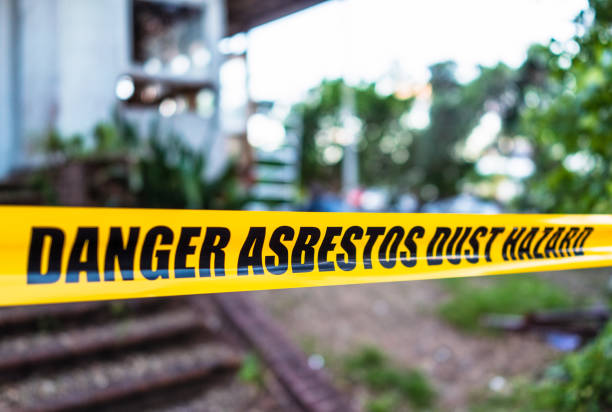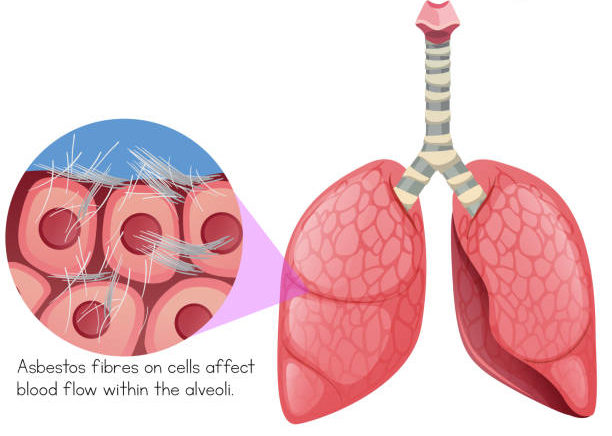What is Asbestos?
Asbestos is a category of six minerals that can be used to make fire-resistant materials.
Although there are safe ways to use asbestos, exposure must be carefully controlled. Until the 1970 passage of the Occupational Safety and Health Act, asbestos was widely used in industrial settings. It was a key ingredient in insulation that goes in walls and attics.
Asbestos is banned across most of the developed world, but not in the United States.

However, its use has been reduced since 1970 because of its hazardous effects on human health. It has been described as “perhaps the best-documented industrial toxin in history.”
Many thousands of people who were employed in industry and the trades prior to 1985 have developed serious health issues linked to asbestos exposure. Incidental workplace exposure is now rare, but some older buildings may still have asbestos-based insulation.
What Conditions is Asbestos Associated With?
The condition most associated with asbestos is mesothelioma. Mesothelioma is a rare disease characterized by tumors of the sensitive lining of the stomach, heart, lungs, and other major organs. This results in a persistent cough, chest pain, and shortness of breath, and can affect individuals who have been diagnosed with Asthma, COPD, or Pulmonary Fibrosis more aggressively.
Some patients also experience fatigue, a loss of appetite, night sweats, bloating, or nausea. Mesothelioma is a chronic condition and symptoms tend to worsen over time. Depending on the stage of the tumor, patients may benefit from surgery, radiation, or chemotherapy.
Although there are fewer than 20,000 cases of mesothelioma every year, people exposed to asbestos are much more likely than average to develop the disorder. Experts estimate there may be millions of people still living who were exposed to asbestos in their youth.
What Research Currently Exists Around Asbestos?

Asbestos is one of the most-researched industrial hazards in the modern world.
Hundreds of papers on its effects have been produced worldwide. However, there is a disconnect between the push to eliminate asbestos in industry and the effort to help patients exposed to asbestos. Most research focuses on engineering or industrial principles rather than on human health. There is sitll much to learn about treating asbestos exposure.
Why Are Further Asbestos Clinical Trials Important?
While the dangers of asbestos are well understood, treatment options for people suffering from asbestos exposure remain limited. Likewise, there are few tests available that can help people who may have been exposed take preventive action before symptoms develop.
Further asbestos clinical trials are crucial for serving the community of mesothelioma sufferers. As many sufferers are now in their 60s or 70s, it is crucial to understand how the progress of asbestos toxicity can be arrested to improve quality of later life.
It’s important to remember that asbestos is not yesterday’s problem. As long as it continues to be used, people will face dangers from asbestos contact and inhalation. Asbestos clinical research is crucial to treating future cases, which will largely affect younger people.
Current Asbestos Clinical Trials
This is the current list of active asbestos clinical trials registered with ClinicalTrials.gov.
New clinical resources for asbestos exposure are still being developed on a regular basis. Patients and their families should watch this space for announcements about additional asbestos clinical studies.
- Lung Cancer Screening in a Population Exposed to Occupational Lung Carcinogenson June 19, 2018 at 4:00 am
Conditions: Lung Cancer Sponsors: Centre Hospitalier Intercommunal Creteil; University Hospital, Bordeaux; Rennes University Hospital; Centre Hospitalier Régional et Universitaire de Brest; University Hospital, Caen; Centre Hospitalier Universitaire de Rouen; Direction Centrale du Service de Santé des Armées Recruiting
Conclusion
Most Americans have seen the TV commercials about asbestos exposure and mesothelioma settlements. These settlements arise from the idea that companies of the past knew asbestos was dangerous and didn’t act. Even as these cases come to an end, though, asbestos is still a serious health risk. Patients of all ages and their families should be alert to new asbestos clinical trials and contribute to them whenever possible.